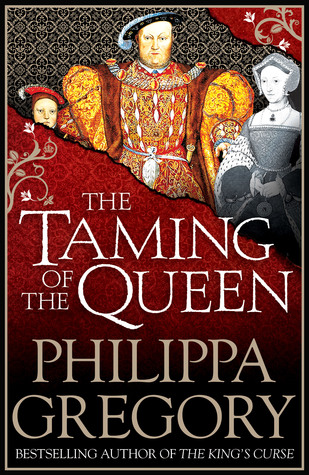Follow my blog!
Tuesday, April 12, 2016
My review of The Taming of the Queen by Philippa Gregory
About the book:
Why would a woman marry a serial killer?
Because she cannot refuse...
Kateryn Parr, a thirty-year-old widow in a secret affair with a new lover, has no choice when a man old enough to be her father who has buried four wives – King Henry VIII – commands her to marry him.
Kateryn has no doubt about the danger she faces: the previous queen lasted sixteen months, the one before barely half a year. But Henry adores his new bride and Kateryn's trust in him grows as she unites the royal family, creates a radical study circle at the heart of the court, and rules the kingdom as regent.
But is this enough to keep her safe? A leader of religious reform and a published author, Kateryn stands out as an independent woman with a mind of her own. But she cannot save the Protestants, under threat for their faith, and Henry's dangerous gaze turns on her.The traditional churchmen and rivals for power accuse her of heresy - the punishment is death by fire and the king's name is on the warrant...
From an author who has described all of Henry's queens comes a deeply intimate portrayal of the last: a woman who longed for passion, power and education at the court of a medieval killer.
My review:
I've read seven of Philippa's books so far and have enjoyed them all. I think, however, that this is my favorite because it delves into the theological issues of the time. That's not something you see very often in history novels. There was quite a bit of detail regarding the Bible and how important it was for people to read it for themselves.There were even some inspiring bits of scripture in the body of the story. Of course, what the Bible actually said didn't back up the Catholic church's teachings. No wonder the papists did not want the common people to know what was being said in Latin masses or those newly educated commoners would no longer follow the church's teachings and practices.
Many history books cover the horrors and the burnings/hangings/beheadings, etc., but they typically don't go into why people felt so strongly about their beliefs that they would rather die than deny their faith. I especially loved the section about Anne Askew and how she refused to betray the queen. She knew that the queen could continue to influence the king and the nation, so it was more important for the protestant cause for her to die than for the queen to be implicated.
I also loved how she showed that women had no choice but to obey their husbands - especially if the husband also happened to be king - and the toll it took on them as people. I'm sure Kateryn Parr worried about the king's future intentions for her given that she was wife number six and he never seemed satisfied for long. For her to be allowed so much freedom and encouragement to write and translate only to later have it used as a means of bringing her to her death by the papists was compelling. I don't doubt that many people were able to manipulate the king, especially when he was ill and on a rage from his health problems.
I found his tactics interesting. Pit people against each other so they fight among themselves. Then they have no time to plot against the king. That's a creative way to divert people from offing you. King Henry did so many things in a fit of rage that he came to regret later that I couldn't help feeling a bit sorry for him despite everything. I didn't like how the queen had to agree with everything he said - crazy as it might seem - to avoid the chopping block herself. There were moments when Henry seemed to genuinely love Kateryn, but there were other times when she must've felt like a second ranked wife over the wife of his only son, who died in childbirth giving him an heir. He venerated her and that's a tough situation for the living spouse.
I found one of the last things Henry talked with his wife about to be very sad. She said he loved his children and Henry came back with a "not really" comment because he said he never felt loved himself. Used for what he could give people and hated by his enemies, maybe. But never truly loved. People wanted power and he could give them that. But ultimately he had all the power until he died. Then it was chaos all around. Better to be a working class person than royalty in those days.
I also felt bummed for the young aristocrats who were innocent but died because their parents implicated them hoping to save their own necks, like young Henry Howard being sent to the tower even though he hadn't plotted against the king. He protested his innocence and died anyway because the privy counsel had a lot of power and wanted to please the king. He couldn't even trust his own family to defend him because his father hoped sending him to the tower would let them keep his own head. So sad.
The Taming of the Queen was an interesting novel rich with theological debate and delving into the contrasting faiths. I loved that the most about this book. It was published by Simon and Schuster and released in August 2015.
Subscribe to:
Post Comments (Atom)

1 comment:
Thanks for sharing important fact, your article is such a fabulous and share some new information.
Oswaal Books
Post a Comment